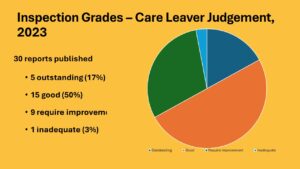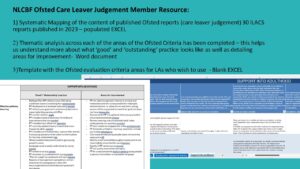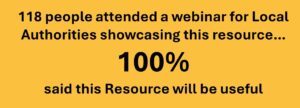The National Leaving Care Benchmarking Forum (NLCBF) recently commissioned Dr Claire Baker to map the first 12 months of the new Ofsted judgement about the experience and progress of care leavers, to create a resource for member local authorities to understand what good practice looks like. Dr Claire Baker has over 20 years research experience, focusing on young people in and leaving care and is a member of the NLCBF Stakeholder Group.
In this conversation between Dr Claire Baker and Hannah McCowen, NLCBF Manager, they discuss the mapping process, the learning so far and the inspiring good practice that has been identified and key messages for those supporting care experienced young people. The resource can be accessed on the NLCBF Members website.
What’s the background to this piece of work?
Claire: Back in January 2023, Ofsted introduced a new separate judgement to the framework for inspecting local authority children’s services – this new judgement is specifically about the experiences and progress of care leavers.
Between January and December 2023, there were 30 inspections published. We’ve looked at the themes across those reports and created resources and tools for National Leaving Care Benchmarking Members.

Around two-thirds of the local authorities inspected received good or outstanding judgements with a third requiring improvement or rated inadequate. We can really learn from both and types of judgements, from what’s working well, but also areas for improvements.
What do you think is the potential of this new separate Ofsted judgement for care leavers?
Hannah: We know from our local authority members that introducing the new judgement has already brought a renewed focus onto leaving care services and that’s been really welcome.
This is great timing as resources in local authorities are extremely tight at the moment and pressures on care experienced young people have increased with the cost of living crisis. Having the separate judgement is ensuring that leaving care services get the focus that they need.
I believe awareness around care experience and the desire to support care experienced young people has never been higher – we see that in local authority leaders and local and national businesses. That gives us a real opportunity to take some big steps forward in terms of the services and support young people receive from local authorities and wider society. The separate judgement is one part of that – I’m really encouraged to see the impact in its first year and I’m looking forward to seeing the fruit of this in the next few years.
Claire: It’s really important to recognise the good work that is going on to support care experienced young people. Support for care leavers ‘lives’ within children’s services, but of course they’re young adults. And so for Leaving Care Managers and services, it may sometimes feel like they don’t quite fit neatly in, but the Ofsted focus is a clear signal that just because children have grown older they are still your responsibility and priority.
Ofsted inspections can be a worrying time and a lot of work goes into inspections (before, during and after) so there is an opportunity to learn from all that work in different local authorities – to share what’s working, the challenges and how we can look for solutions together.
What does the mapping work look like?

Claire: The Ofsted Evaluation Criteria for the Care Leavers judgement identifies a number of different areas that inspectors ask about. These areas were developed following a consultation exercise that I know that NLCBF, the Young People’s Benchmarking Forum and a lot of other organisations fed into.
In this exercise, we mapped the comments in the 30 published reports to each of the Ofsted evaluation criteria themes – highlighting what inspectors identified as good and outstanding practice and areas that needed strengthening.
We’ve developed this into a resource that local authorities can take away and map out their services against – identifying areas of strength and areas for development.

What were some of the positives that came out of the Ofsted reports?
Claire: There were areas of strength in all of the reports. Picking up on just one of the themes, Wellbeing and Health, some of the good and outstanding practice we saw in the Ofsted reports included:
- Bespoke wellbeing offers in place.
- Having access to a range of community based services or specialist services, so it wasn’t just one option.
- Specialist practitioners within the teams who supported young people and were also an important support to Personal Advisers.
- Examples of support that focussed on healthy lifestyles and acknowledged other things that contribute to wellbeing, as well as responding to crises.
- Flexible support that included young people living out of area.
- Social workers and PAs thinking creatively to understand young people’s emotional attachments, including to their pets.
- PAs being inquisitive about what life is like for the young people they support and how they can understand the impact of trauma.
Hannah: The mapping looks at so many areas including effective pathway planning and Personal Advisers, secure and stable housing etc. It was great to see in so many reports the examples of ways that leaving care teams are tailoring the support around young people with specific needs – for example care experienced parents; unaccompanied minors and those in custody.
It was also good to see the relationships that Personal Advisers have built with the young people they support being recognised across the reports, including this example:
“Personal advisers are strong advocates for their young people. They know young people well and are committed, caring and dedicated to improving their lives.” Medway Report
What are some of the key areas of challenge?
Claire: Going back to support around wellbeing and health – we can also learn on the flip side from areas where this was weaker. Ofsted reports highlighted: long waiting lists; gaps in provision; leaving care professionals not feeling confident about providing support or having access to limited training. This was frustrating for both the staff and young people involved because young people were left without their needs being met.
Hannah: Looking at the results of this mapping exercise, it’s really clear to see the negative impact of high workloads for Personal Advisers. It’s not a surprise to see that this is impacting the quality of support available to a young person – in terms of meeting their PA early enough and still receiving support when things are going well and not just at crisis points. We know from many of the young people in the Young People’s Benchmarking Forum, their relationship with their PA can be an absolute lifeline and having a consistent person who believes in them and who takes time to get to know them can make all the difference. This points to wider funding and capacity challenges, beyond the control of the leaving care team.

How is the voice of young people important in the reports?
Claire: In the reports, we see good examples of local authorities having a wide range of participation activities, with a whole range of ways to listen to the voices of young people.
Inspectors identified that care experienced young people feeling connected to their senior leaders was really important. Do young people know senior leaders within the council? Do leaders visit the care leavers’ hub? There’s some good examples of care experienced young people co-chairing corporate parenting boards and setting the agenda and then importantly, senior leaders taking action after hearing the priorities from their young people..
Were there any gaps in the mapping that you noticed?
Claire: Because we worked systematically on the mapping, we did note that there were some gaps – that is, despite the fact that themes were included in the Ofsted evaluation criteria, in reality, they were rarely recorded in the reports. There might still have been discussions about these areas during the inspection visits, but they don’t seem to make the reports. Examples of gaps included: support around accessing records and understanding identity, support to challenge discrimination, having fun and access to advocacy.
What are the key messages for those supporting care experienced young people?
Claire: Even for local authorities who were graded as good, reports often included issues related to the transition point from being a child in care to a care leaver, Ofsted pinpointed concerns about rushed transitions. Important things like getting to know your PA to allow relationships to start to develop prior to leaving care, discussions about accommodation and financial issues started too late were highlighted as areas for improvement.
At this transition point, there’s a risk that you can undo a lot of the good work that has hopefully happened for in children in care. It reminds us that the separation of care leavers and children in care is a false one and that is our responsibility to improve how we join up and make sure that handovers are properly in place.
Hannah: That transition is a really important challenge for children in care services, leaving care services and also supported accommodation providers. It’s something we have to get right and an area that we are going to think more about within the forum this year. We are going to create opportunities for local authorities to share ideas and examples of what’s working well in transition from looked after service to leaving care service.
How can people get hold of this work and what are the plans for keeping it updated?
Hannah: This resource is accessible to all of the 133 NLCBF member local authorities and we have also shared it with the DfE and Ofsted, who we work closely with. We’ve already had excellent feedback from Leaving Care Managers who are taking the resources away to map their own provision and to work with their senior leaders, care experienced young people and partner organisations to identify areas for development.
The exercise has also identified so many example of good practice that we will be looking to share through NLCBF’s events and networks this year. We will be commissioning Claire to update the mapping later this year.
“Fantastic piece of work, this really provides excellent insight into the expectations of inspectors when applying the framework and really helps with self assessment.” Leaving Care Manager.
“Really fantastic resources for local authorities to use and to learn from each other.” Leaving Care Manager

